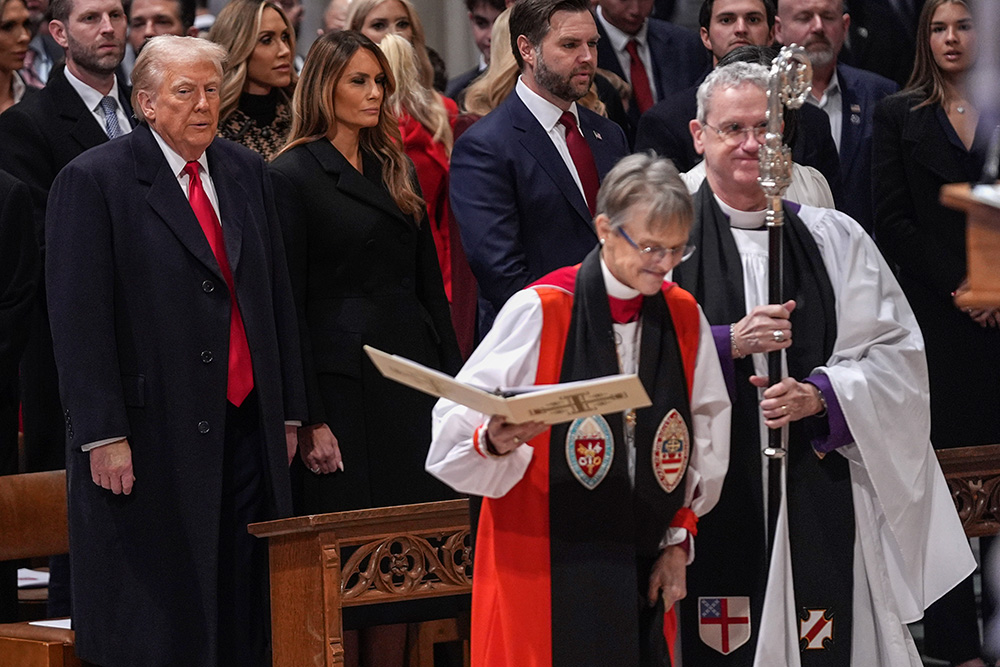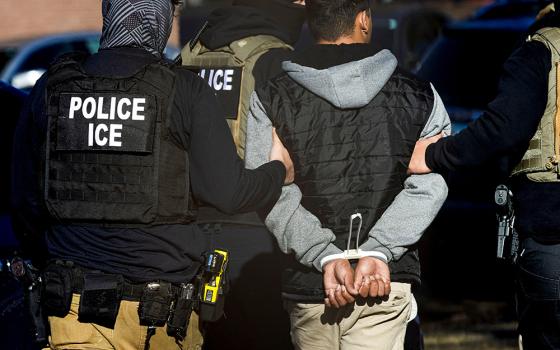
President Donald Trump, left, watches as Bishop Mariann Budde arrives at the national prayer service at the Washington National Cathedral Jan. 21, 2025, in Washington, D.C. (AP/Evan Vucci)
The words that Episcopal Bishop of Washington Mariann Budde spoke were few. They weren't shouted. They weren't demanding. They consisted of insights and a request that might be heard anywhere at any time in a house of worship.
Because those words were spoken directly to the newly, second-time elected president of the United States during a widely covered prayer service at the Washington National Cathedral, they are likely to be remembered long after this administration has gone the way of the next election.
Hers was but one voice amid a growing chorus of religious figures condemning the Trump administration's plans for mass deportation. Unlike others, however, she had the opportunity to address the president directly. The words have gone viral, but it is worth repeating them here:
In the name of our God, I ask you to have mercy upon the people in our country. ... The people who pick our crops and clean our office buildings, who labor in poultry farms and meatpacking plants, who wash the dishes after we eat in restaurants and work the night shifts in hospitals. They may not be citizens or have the proper documentation, but the vast majority of immigrants are not criminals. They pay taxes, and are good neighbors. They are faithful members of our churches and mosques, synagogues, gurdwara and temples. I ask you to have mercy, Mr. President, on those in our communities whose children fear that their parents will be taken away, and that you help those who are fleeing war zones and persecution in their own lands to find compassion and welcome here.
What Budde did wasn't just taking advantage of an opportune encounter with the commander in chief. What she did was something she was obliged to do as a disciple of Christ preaching the Christian message. She gave a human face to those who, in the approach of a heartless administration, are a faceless group, shamefully maligned and made into a national scapegoat. They have become the new enemy, the inhuman "other" upon which our social ills and anxieties have been heaped.
Some will disparage her words as a bit of performative preaching. Others will dismiss them because there will never be proof her words provided solace or safety for immigrants. Others will apply political calculus to her message and wonder which voters she might have affected or whether she merely solidified entrenched divisions in the Christian world as well as the wider culture.
Advertisement
All of that is irrelevant noise.
Was Jesus chastised for failing to accurately calculate the displeasure of Roman and religious leaders before pronouncing his next discomfiting truth?
If a Christian leader in her pulpit, addressing a president who voluntarily placed himself in that sacred space, cannot speak out of the heart of the Gospel, then we might as well turn our cathedrals, basilicas and other houses of worship into museums.
President Donald Trump and Vice President JD Vance spent months ginning up inordinate fear among immigrant communities and exploiting the lies beneath that fear for political purposes. Trump has pardoned violent criminals who attempted an insurrection. He has been celebrated by crude racists and those who would endanger the LGBTQ community.
If Budde had not addressed those fears and begged for mercy, the service would have been, at best, a disingenuous engagement and, at worst, an act of fraud and cowardice.
Given Trump's general avoidance of worship spaces, it is unlikely that any other minister of the Gospel will have the opportunity to confront him as directly. It is gratifying then to know that, in addition to Budde, there is a growing chorus of Christian leaders condemning Trump's intended mass deportations and his insistent lies that the immigrant population is made up mostly of criminals.
Pope Francis, in an unusually blunt assessment, called Trump's mass deportation plans "a disgrace." Cardinal Robert McElroy, the newly appointed archbishop of Washington, warned earlier this month that an indiscriminate mass deportation program would be "incompatible with Catholic doctrine."
Trump, who declared in his inaugural address that his election was divinely ordained, may energize and unite mainline Christianity in the United States in a way we haven't seen for decades.
Archbishop Timothy Broglio, president of the U.S. Conference of Catholic Bishops and head of the Archdiocese for Military Services, included additional elements in his critique: "Some provisions contained in the Executive Orders, such as those focused on the treatment of immigrants and refugees, foreign aid, expansion of the death penalty, and the environment, are deeply troubling and will have negative consequences, many of which will harm the most vulnerable among us."
Bishop Mark Seitz of El Paso, a Texas diocese on the border with Mexico, issued a lengthy condemnation of Trump's plans, saying they "deeply affect our local community and raise urgent moral and human concerns."
The Department of Homeland Security's decision to permit immigration raids in schools and churches "strikes fear into the heart of our community, cynically layering a blanket of anxiety on families when they are worshiping God, seeking healthcare, and dropping off and picking up children at school," Seitz said.
In comments made during a Mass at the Basilica of Our Lady of Guadalupe in Mexico City, Chicago Cardinal Blase Cupich said, "The Catholic community stands with the people of Chicago in speaking out in defense of the rights of immigrants and asylum seekers."
Understandably, the cardinal also opposes attempts by "government agencies to enter places of worship for any enforcement activities."
Other denominations, including Quakers, Presbyterians, Unitarians and the United Church of Christ have all publicly declared opposition to mass deportations and support for immigrants. The Evangelical Lutheran Church in America has declared itself a "sanctuary denomination."
Underneath those declarations and public statements, untold numbers of groups, parishes, congregations, synagogues and organizations are making plans to blunt the Trump administration policies. Who knows? Trump, who declared in his inaugural address that his election was divinely ordained, may energize and unite mainline Christianity in the United States in a way we haven't seen for decades.
In the meantime, one of God's servants has intervened in a modest and respectful way, begging for mercy for the most vulnerable among us. It is an unremarkable ask for a Christian leader, but it may take remarkable action from the rest of us to see mercy served.




